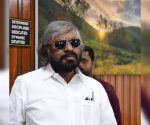K’taka transfers top DK cops, forms new force to nix communal trouble | Bengaluru News

Mangaluru/Bengaluru: Following communal tension and a spate of murders in the restive coastal Karnataka, the state govt Thursday night transferred Mangaluru City police commissioner Anupam Agarwal and Dakshina Kannada superintendent of police Yateesh N with immediate effect.The govt issued transfer order hours after announcing the formation of Communal Violence Control Force (CVCF) comprising personnel from Anti-Naxal Force (ANF). The new force will be deployed in Mangaluru, Udupi, and Shivamogga, the three districts witnessing heightened communal tension.The twin near-simultaneous developments follow a wave of resignations announced by ground-level workers of Congress minority wing in Dakshina Kannada over state govt’s alleged failure to protect the minorities in coastal Karnataka. Several Muslim functionaries and office-bearers quit, accusing the govt of negligence and failing to safeguard the Muslim community amid recent targeted killings.Sources said the police transfer order was to send out a message that the govt is serious about ensuring law and order and no community should feel it’s in jeopardy.The mass resignations were announced during an emergency meeting at Shadi Mahal auditorium in Bolar, Mangaluru, attended by both booth-level workers and senior workers. Party workers stormed the stage, demanding justice for Abdul Rahiman, secretary of Kolathamajalu mosque who was brutally murdered recently.KPCC general secretary MS Mohammed, DK district Congress minority unit president Shahul Hameed and former corporator Abdul Rauf were present at the meeting, which descended into chaos. Emotional scenes unfolded as leaders struggled to calm the agitated crowd. Workers accused the leadership of backtracking after initially deciding to postpone their resignations.Under intense pressure, Suhail Kandak, who was state secretary in Youth Congress, was the first to quit as a member of the party, triggering a chain reaction.Amid uproar, CM Siddaramaiah in Bengaluru issued a stern warning. “We will take action as per law against anyone involved in it irrespective of how influential that person is. No one is above the law. Law alone is above all,” he declared.To address the escalating crisis, the government has repurposed part of the ANF, now largely dormant following a decline in Naxal activity in Karnataka. Of the 648 existing posts in the ANF, 248 will be allocated to the new force. The govt order on Thursday said, “The new STF will have three companies and they will be established in Udupi, Shivamogga and Mangaluru districts.”According to the order, the Communal Violence Control Force will include an intelligence unit with a technical cell to monitor hate speech and communal activity across media and social platforms. It will also focus on early-warning systems, outreach programmes, and monitoring radicalisation.The DG&IGP will oversee deployment of CVCF personnel during communal riots. The remaining 376 ANF staffers will continue in service for three more years due to intelligence inputs that Maoists may be shifting from Chhattisgarh and Jharkhand to Karnataka’s border regions.Home minister G Parameshwara said the Mangaluru murder had forced the government into immediate action. “We will take action without any hesitation. If such incidents keep recurring, we cannot remain silent. We will further tighten the law,” he said.He reiterated that Mangaluru, Udupi, and Shivamogga will be treated as sensitive zones. “We will focus more attention on these three districts,” he said. “If hatred spreads, what will remain of society? How can people live in such an environment? The government will not stay silent.”Parameshwara added that investigations into the Mangaluru murder have revealed disturbing details. “Serious information has come to light, and action will be taken accordingly.” He also appealed to political leaders to help restore peace. “If they try to provoke people, how can peace be maintained? I have instructed officials to hold peace meetings with religious leaders,” he said.
















